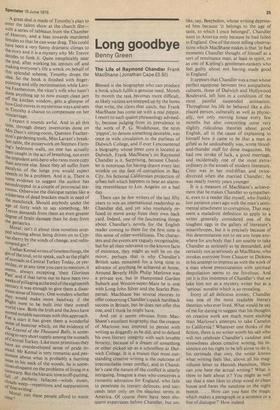Long goodbye
Benny Green
The Life of Raymond Chandler Frank MacShane (Jonathan Cape £5.50)
Blessed is the biographer who can produce a book which fulfils a genuine need. Month by month the task becomes more difficult, as likely victims are snapped up by the bores that write, the claws that catch, but Frank MacShane has come up with a real pippin.
I resort to such quaint phraseology advisedly, because judging from its prevalence in the work of P. G. Wodehouse, the term 'pippin', to denote something desirable, was once in wide circulation in the purlieus of Dulwich College, and if ever I encountered a biography whose inner core is located at Dulwich, Frank MacShane's on Raymond Chandler is it. Surprising, because Chand ler is notorious for having drawn every last wrinkle on the face of corruption in Bay City, his fictional Californian projection of urban hell which happens to bear an alarming resemblance to Los Angeles on a bad day.
There can be few writers of the last fifty years to win an international readership as Chandler did, and yet who resolutely refused to move away from their own back yard. Indeed, one of the fascinating things about Chandler's novels for the English reader coming to them for the first time is this sense of other-worldliness. The characters and the events are vaguely recognisable, but for all their relevance to the known facts of existence, they might as well be on the moon; perhaps that is why Chandler's British sales remained for a long time in advance of anything he achieved at home. Around Beverly Hills Philip Marlowe was a private eye, but in Hampstead Garden Suburb and Weston-super-Mare he is one with Long John Silver and the Scarlet Pimpernel. MacShane has several theories to offer concerning Chandler's quick hardback success in Britain, but he does not offer this one, and I think he might have.
And yet it seems obvious from MacShane's excellent biography that the creator of Marlowe was inspired to persist with writing as doggedly as he did, and to defend his own literary integrity with such lovable ferocity, because of a dream of something or other picked up as a schoolboy at Dulwich College. It is a truism that most out. standing creative writing is the outcome of' irreconcilable inner conflict, and in Chandler's case the nature of the conflict is utterly intriguing. Imagine a man who conceives a romantic adoration for England, who fails to penetrate its literary defences, and succeeds later only on the sleaziest terms in America. Of course there have been eloquent expatriates before Chandler, but un
like, say, Beerbohm, whose writing depressed him because 'it belongs to the age of taste, to which I once belonged', Chandler went to America only because he had failed in England. One of the most telling observations which MacShane makes is that 'in bad moments Chandler thought of himself as a sort of remittance man, at least in spirit, or as one of Kipling's gentlemen-rankers who feel guilty about not having made good in England'.
It appears that Chandler was a man whose perfect equipoise between two antipathetic cultures, those of Dulwich and Hollywood Boulevard, left him in a condition of the most painful suspended animation. Throughout his life he behaved like a displaced person, culturally as well as physically, not only moving house every few months but also concocting some very slightly ridiculous theories about good English, all in the cause of explaining to himself how it came to be that a man as gifted as he undoubtedly was, wrote bloodand-thunder stuff for dime magazines. He had one stroke of luck, a good marriage, and incidentally one of the most extraordinary in the annals of modern literature. Cissy was in her mid-fifties and twicedivorced when she married Chandler; he was nearly twenty years younger
It is a measure of MacShane's achievement that he makes Chandler so sympathetic, even to a reader like myself, who frankly lost patience years ago with the man's sentimental attachment to corruption. That may seem a maladroit definition to apply to a writer generally considered one of the toughest eggs in the gallery of literature's misanthropes, but it is precisely because of this determination not to see any hope anywhere for anybody that I am unable to take Chandler as seriously as he demanded, and certainly not as seriously as MacShane, who ' invokes everyone from Chaucer to Dickens in his attempt to impress us with the work of a man whose preoccupation with spiritual despoliation seems to me frivolous. And yet it is this insistence of Chandler's that we take him not as a mystery writer but as a 'serious' novelist which is so revealing.
Irony of all delicious ironies; Chandler was one of the most readable literary theorists who ever lived. What would he say of me for daring to suggest that his thoughts on creative work are much more exciting than Marlowe's attempts to take Camelot to California ? Whatever one thinks of the fiction, there is no writer worth his salt who will not celebrate Chandler's candour and shrewdness about creative writing, his in sistence on his right to be left alone to do it, his certitude that only the writer knows what writing feels like, above all his mag nificent letter to Hamish Hamilton, 'How can you hate the actual writing ? What is there to hate about it ? You might as well say that a man likes to chop wood or clean house and hates the sunshine or the night breeze. . . How can you hate the magic which makes a paragraph or a sentence or a line of dialogue How indeed.


































 Previous page
Previous page